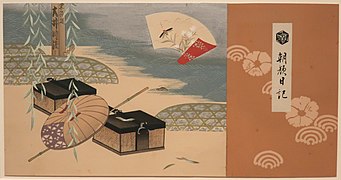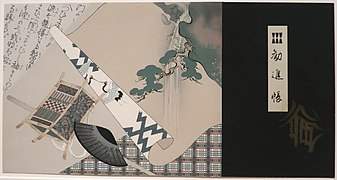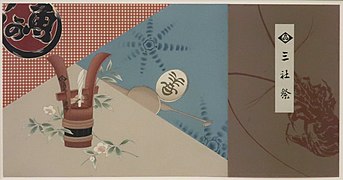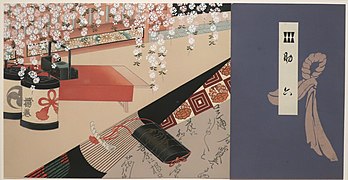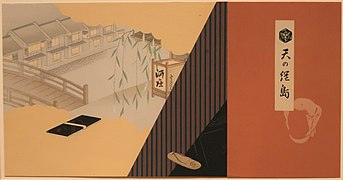Kojima Gyokuhō
Kojima Gyokuhō (児嶋 玉鳳, 1907–1934) was a Japanese artist. Little is known about him, except that he worked with the Kyoto City publisher Happōdō. He rejected the Western concept that art was an expression of the artist's individuality. Rather, he embraced the traditional method of producing woodblock prints through the cooperation of a designer (artist), a woodblock carver, a printer, and a publisher. He also favored traditional Japanese subjects, such as Japanese textiles, kabuki, and ukiyo-e masterpieces.
Prints
Kojima is best known for his series One Hundred Poetry Illustrations. It consists of 50 woodblock prints. Each print is about a traditional Japanese poem. The series were published by Kondo Happodo in Kyoto in 1932. For the prints he used metallic pigments, gofun, and embossing.
Gallery
- One Hundred Poetry Illustrations: A Collection of Multicolor Woodblock Prints by Kojima Gyokuhō, c.1934
-
Asagao Nikki
-
Kanjincho
-
Kasane Ogi
-
Kibun Daijin
-
Michitose
-
Nozaki Mura
-
Ohancho
-
Onatsu Kyoran
-
Sanja Matsuri
-
Sugawara Denju Tenarai Kagami
-
Sukeroku
-
Ten no Amijima
-
Yodo no Kawase
References
- ^ Honolulu Museum of Art
- ^ Honolulu Museum of Art, wall label for The Graphic Design of Kojima Gyokuhō, January 10, 2019 - March 10, 2019
- ^ Michener, James A., The Floating World, Random House, New York, 1954, p. 148
- ^ Honolulu Museum of Art, wall label for The Graphic Design of Kojima Gyokuhō, January 10, 2019 - March 10, 2019
- ^ "Original woodblock prints bound in two albums - Published by Kondo Happodo (50) - Cardboard, Mulberry paper - Kojima Gyokuhō 児嶋玉鳳 (1907-1934) - "Utae hyakuban" 歌絵百番 (One Hundred Poems) vol 1 (parts I & II) - Japan - 1932". LOT-ART. Retrieved 21 December 2021.
